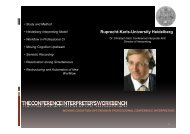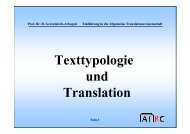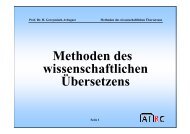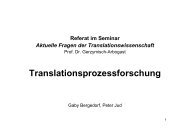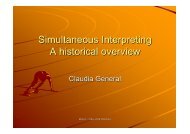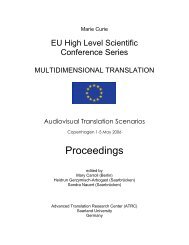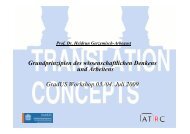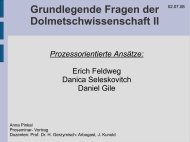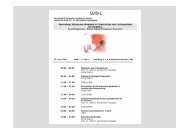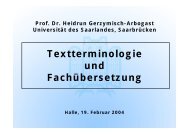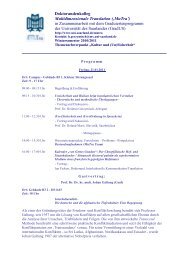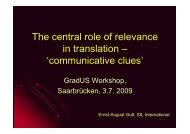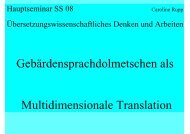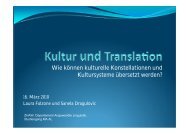Proceedings - Translation Concepts
Proceedings - Translation Concepts
Proceedings - Translation Concepts
Create successful ePaper yourself
Turn your PDF publications into a flip-book with our unique Google optimized e-Paper software.
EU-High-Level Scientific Conference Series<br />
MuTra 2005 – Challenges of Multidimensional <strong>Translation</strong> : Conference <strong>Proceedings</strong><br />
Claudio Bendazzoli & Annalisa Sandrelli (Forlì, Bologna) 1<br />
An Approach to Corpus-Based Interpreting Studies:<br />
Developing EPIC<br />
(European Parliament Interpreting Corpus)<br />
Contents<br />
1 Introduction<br />
2 Methodological issues in interpreting research<br />
3 The EPIC multimedia archive<br />
4 The EPIC corpus<br />
5 Research and pedagogical applications<br />
6 Conclusions<br />
7 References<br />
Abstract<br />
Empirical research on simultaneous interpreting is hampered by the problem of collecting<br />
sufficient material (recordings of source speeches and interpreted target speeches) for the testing of<br />
hypotheses and validation of existing theories. In other words, corpora have long been awaited in<br />
the field of Interpreting Studies. In January 2004 a research group on corpus-based interpreting<br />
studies was set up in the Department of Interdisciplinary Studies in <strong>Translation</strong>, Languages and<br />
Cultures (SITLeC) of the University of Bologna at Forlì, in order to create an electronic parallel<br />
corpus with source and target speeches in Italian, English and Spanish. The main research interest<br />
of the group is the study of interpreters’ strategies across different language directions<br />
(directionality) and language-pair related difficulties. In this paper, the authors illustrate the<br />
various stages of development of the EPIC corpus, highlighting both research and pedagogical<br />
applications of this “multidimensional” tool comprising video, audio and written materials, which<br />
can be retrieved, selected and analyzed by using corpus linguistics techniques. 2<br />
1 Introduction<br />
In January 2004 a research group on corpus-based interpreting studies (the Directionality<br />
Research Group 3 ) was set up in the Department of Interdisciplinary Studies in <strong>Translation</strong>,<br />
Languages and Cultures of the University of Bologna at Forlì, in order to study conference<br />
interpreters’ strategies across different language directions (directionality) and language-pair<br />
1 Although the present article is the result of a joint effort, Claudio Bendazzoli can be identified as the author of<br />
(3), (4), and (5.1), whereas Annalisa Sandrelli is the author of (1), (2), and (5.2). The Conclusions (6) were<br />
jointly drafted.<br />
2 For an update on investigations on the basis of the EIPC corpus cf. Annalisa Sandrelli/Claudi Bendazzoli, The<br />
EPIC corpus - first results. <strong>Proceedings</strong> of the third Mutra Conference ‘LSP <strong>Translation</strong> Scenarios’. Vienna<br />
30 th April - 4 th May 2007. Edited by Sandra Nauert. Saarbrücken: www.euroconferences.info/proceedings.<br />
3 The other members of the Directionality Research Group are Mariachiara Russo, Cristina Monti, Marco<br />
Baroni, Elio Ballardini, Silvia Bernardini, Gabriele Mack and Peter Mead. The EPIC web designers are<br />
Lorenzo Piccioni and Eros Zanchetta.<br />
© Copyright 2005-2007 by MuTra 149



